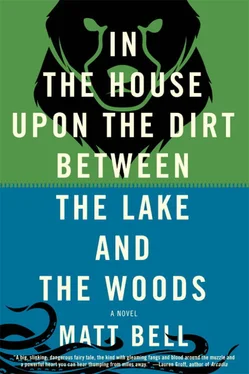You do not remember where their faces come from, and they are not yours.
I said, They were never your children. Not these.
I said, Your son is dead.
We buried him, I said, and despite these ghosts he has not come back.
She cried at the door, her voice so close I could feel its vibration in the wood beneath my cheek. She said that she did remember, that she was trying to remember them all.
She said, You told the story wrong, deceived me, hid me from what was mine.
She said, We had so many children, more than you said, and now I want to love them all.
No, I said. No. We had one, and you had one, and both are gone.
Her long motherhood was again upon her, half recalled, and want overwhelmed her, made her some senseless animal, banging and banging against the inside of the door, this trap with which I meant to hold her.
And then the banging stopped.
And then it did not resume.
And then when I opened the door, the bedroom was empty of everything except some tiny wind, blowing through the open window, rustling the curtains across the frame.
And then I had lost her again, because by the time my slower gait returned me to the tree line already I was too distant to do anything but watch as the foundlings parted ranks for her to pass, as they closed that same breach against me: Before me my wife was consumed by the churning crowding of her new foundlings, taken away within a deadly scrum from which she did not return.
MEMORY AS NEW MONTHS SPENTalone: To again be without companionship, except for the ranks of foundlings waiting at the tree line, whose stern bodies would no longer let me pass, and who would not bring me word of my wife, no matter how I begged. To again live in a world of unfaithful wives, a world where mothers chose their children over their husbands. To complain aloud and to no one of this unfairness, to pretend that there was no deeper person in her than what I gave her back, and yet, and yet.
To admit that no matter how I wanted her to be my wife first, still she had not been just mine, not since the moment of our first conception, all those years ago.
To admit defeat, because she never would be mine alone, not ever again, and it was I who had failed to join her, to become some true father to complement her endless motherhood, instead remaining only her husband, that insufficient shape to which always I stubbornly clung.
FROM MY STATION ON THEdirt I kept my vigil, watching for my wife’s return from just outside the woods. Whenever I was not weeding our garden or keeping straight our house or maintaining some other part of what world I had been left to steward, then I would return to my chosen spot, close enough to toss the foundlings whatever fruits and vegetables had ripened that day, and each time I fed them I grimaced to watch their hunger grow, but if there was never enough to feed them all, then what other option existed but to provide for some? Afterward, I laid my old bones upon the hard dirt, then waited, waited and watched as they resumed their previous activities, their actions as varied as their faces, their shifted shapes. I memorized the different foundlings that came to the edge of the woods, the ones that kept me from walking beneath its trees, and again I made some catalogue or listing, some roll call unscrolling—and by their differences I knew I named them, even if I had not meant to.
In one foundling, I heard my wife’s laugh and, in another, her sigh, some exclamation.
And in this foundling, I saw my wife’s features most complete, the boy’s face like her face, her raven hair long and flowing upon his shoulders.
And in this foundling, her touch, smoothing back the hair of a brother covered in mud and dirt, hungry and hurting, for what food there was was never enough.
And in this foundling, a game I remembered her teaching him, as she had been taught, as he now taught the others.
And in this foundling, a voice like my wife’s, singing some snatch of the song I sought. And in this one, some other part, and in this one, a third.
And in this foundling, a look like she had given me, like she gave me often, a look that could mean one or a dozen things, and how it pained me to remember each one, and also them all.
And in this foundling, I saw the bear, her long limbs, her dense muscles, and I saw her apartness, her knowledge that she had given up much to become what she was. I saw this and more, all on the face of one child, who could not understand from what lamentations he was made.
And in this foundling, an angry lesson, scarred into a face burned not here but somewhere far above us, far behind. A face never resung into beauty, belonging to this boy holding down one of his brothers, poking fingers into the younger boy’s eyes and nose and mouth. He pinched and folded the flesh of the other’s face ugly as his own, and even then he did not stop, even though I cried out to him, even though I pleaded from the dirt, and as always it was as if my words could not cross the thin border between my domain and theirs, and as always it was only as if.
And in this foundling, the kindness of the mother, rocking some smaller child to sleep, cooing all the while, as if mere sound were enough to wish the wicked world away.
And on this foundling, a suit of skin, torn free from another brother, left to wander more naked than naked. And how the skin was sewn with hair. And how it was stained with his brother. And how it kept the foundling warm, so that while the others shivered in the almost dusk, this newly clothed killer stood tall and proud, stupid and unafraid, despite all the world around him, the cold and the tired conspiring to bring him low.
And in this foundling: again, the bear, and now more of her in each new brother.
And so in this one: clawed hands at the end of too-long limbs.
And in another: a hump of muscle twisting his back, giving strength to shoulders and fists.
And in another: a mouth so filled with teeth the lips couldn’t fit over what they contained, that jutting sharpness.
And in another: a body covered with snarling fur, thicker than any yet seen, but not thicker than what was yet to come.
And in this foundling, again more of the first: His high, lilted voice. His strange way of standing, cocked sideways, unsure upon his legs. His small hands, his crowded teeth. His hair, thick and curled, like no one else’s, at least no man’s. His way of playing, often alone, often at some distance, as if every game required no other player, and also his eyes, dark and accusing, set in a dozen and then two dozen heads, all looks landing on me, lingering hard and long and suspicious, and it was no mystery to me that these gazes remained unfooled, untricked by what gentler old man I had tried to become, had pretended I had.
I kept one last watch at the edge of the woods, and when morning came still there was no sign of my wife, just these dozens of worsened children, and again they refused to part, to make way for me to enter. Even the smallest were like standing stones against me, and the oldest shook their sticks and lifted their fist-sized rocks, barked threats, and there was no peaceful way to pass their barricade. I stepped back, gathered my breath, then let loose nearly all the sound I had in me, emptied it against their own loud voices until they were culled into silence, until all the air was mine.
Every eye was watchful upon me, and to their attention I said, I am coming through you, and then I am going to my wife, to bring her back or else to stay at her side.
I said, You will not stop me.
I said, I love her and am her true husband, the only one there ever was, and the truth of that will grant me passage against you, all you ghosts.
Читать дальше













